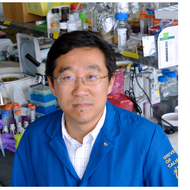Antibodies developed at the University of California, Riverside (UCR), and licensed to Releviate Therapeutics may contribute to a significant advancement in the treatment of chronic pain as an alternative to opioids.
Every year, more than 50 million adults in the United States suffer from chronic pain, a serious condition that negatively affects quality of life. Today, opioids are a commonly prescribed medication to treat chronic pain. However, they have negative side effects, including addiction, overdose, and death. An alternative to opioids is desirable to treat chronic pain and would contribute to ending the opioid crisis.

Professor Xin Ge of the department of Chemical and Environmental Engineering at UCR’s Marlan and Rosemary Bourns College of Engineering identified a novel antibody approach to treat chronic pain. Supported by U.S. National Institutes of Health and National Science Foundation, in addition to proof-of-concept funding from UCR’s Office of Technology Partnerships, Professor Ge developed MMP-9 and MMP-14 antibodies, which can be used as an effective non-addicting pain therapy. In collaboration with Professor Ru-Rong Ji from Duke University, Professors Ge and Ji showed that MMP-9 antibodies significantly relieved neuropathic pain development in mice.
This research caught the attention of an entrepreneur from San Diego, California who formed the biotech startup Releviate Therapeutics to commercialize the technology. UCR and Releviate signed an exclusive license that allows Releviate to further develop the MMP-9 and MMP-14 antibodies to treat chronic pain in patients. “These antibodies are highly selective for MMP-9 and MMP-14 respectively, unlike previous peptide and small molecule based inhibitors. Such high selectivity is the key to breakthroughs in MMP therapies given that all past MMP targeting therapies have failed in clinic trials due to unwanted toxic off-target effects,” Professor Ge commended.
“UCR’s research is contributing to solve important problems in society, the MMP-9 and MMP-14 monoclonal antibodies are examples of the groundbreaking research of our university. We are enthusiastic about the commercialization opportunities of these technologies for public benefit,” said Brian Suh, Director of Technology Commercialization at the University of California, Riverside.
For more details on this announcement refer to Releviate’s press release.
Learn more about Professor Ge’s Research Lab, UCR’s Office of Technology Partnerships and other technologies available for licensing.